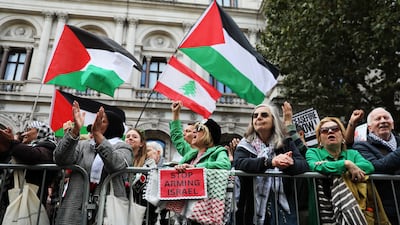Live updates: Follow the latest on Israel-Gaza
Frustration is growing at the Labour government’s foreign policy in the Middle East, which critics in the UK say is a middle ground that satisfies no one.
The government, which marks 100 days in power on Sunday, took three main decisions on the Israel-Palestine conflict when it came into office, saying it would be guided by international law in its decision-making on foreign policy.
Within weeks, it restored UK funding to the UN’s Palestinian relief agency and dropped Britain’s challenge to the International Criminal Court over the request for an arrest warrant for Israeli Prime Minister Benjamin Netanyahu.
Then it imposed a partial ban on arms sales to Israel – for weapons and components used in Gaza.
However, Palestinian ambassador to the UK Husam Zomlot described the partial arms embargo as a “half step in the right direction, but incomplete, not enough”.
“It's almost half-heartedly taken, and we need to make sure that … the respect of law is undivided."
Cautious approach
Some fear the government has been cornered into making decisions that are driven by legal technicalities rather than political views. “The more they can say they are legally bound by a decision, the easier it will be for them to take it,” a former British diplomat told The National.
“They’re remarkably cautious as a government on foreign policy. They will watch what others do before they make a move.”
A case in point is the UK’s abstention from a UN General Assembly vote endorsing the findings of the UN's International Court of Justice about the illegality of Israel’s occupation of Palestinian territories.
“We hear from them that they are committed to international legality in its entirety, but when it comes to be translated into political action, things are different,” Dr Zomlot said, in reference to the vote.
The previous Conservative government “broke a taboo” when it applied sanctions on extremist Israeli settlers in the West Bank, and more could be done by the new Labour government to expand the “sanctions network”, Mr Zomlot added.
Critics on the side of Israel said the decisions are playing into the hands of Hamas.
“The move ... risks sending a dangerous message to Hamas and other adversaries of the UK that they can commit appalling atrocities – condemned by the UK government – and yet still see Israel castigated," the Board of Deputies of British Jews said when the partial arms ban was announced.
Foreign Secretary David Lammy defended the decision to impose the partial arms ban during October 7 commemorations this week.
"When you look at Israel facing rockets from Iran. When you think hard about the neighbourhood that it's in. The Houthis firing rockets. Hezbollah and their actions. I don't think it can be right to impose a full arms embargo and that is not something the UK could endorse," he told Sky News.
Pre-election pledges
An anticipated escalation of Israeli and Iranian hostilities has put all decision-making at a standstill, while calls for tougher stances pledged before the election are growing.
Prime Minister Keir Starmer used the October 7 commemoration to repeat calls for a ceasefire.
"One year on from these horrific attacks we must unequivocally stand with the Jewish community and unite as a country. We must never look the other way in the face of hate," he said.
"We must also not look the other way as civilians bear the ongoing dire consequences of this conflict in the Middle East. I reiterate my call for immediate ceasefires in Gaza and Lebanon, and for the removal of all restrictions on humanitarian aid into Gaza," he said.
Before it came into government, Labour had said it would proscribe Iran's elite military wing the Islamic Revolutionary Guard Corps – after former prime minister Rishi Sunak resisted calls to do so.
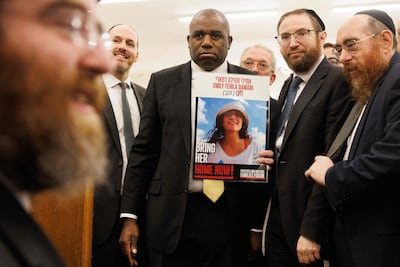
But the government appears to be holding back as the threat of a regional war looms. Defence Secretary John Healey would not give an indication as to when or whether this was likely to happen when pressed by UK media earlier this week.
Also this week, MI5 director Ken McCallum’s warned of the national security threats to the UK from the IRGC. British intelligence had thwarted 20 Tehran-backed plots that “presented potentially lethal threats to British citizens” since the start of 2022, he said.
Evacuations
In the past week, the Foreign Office has been focused on the urgent task of getting British citizens out of Lebanon, while continuing its work of seeking a ceasefire in Gaza and Lebanon.
Mr Starmer met US, German and French leaders last weekend for talks on the latest developments in the Middle East, and Mr Lammy made another tour of the Arab nations.
Describing the world as a “great power competition”, the Labour government has sought to strengthen its position through coalitions with western allies as it seeks de-escalation in the Israel-Gaza war and a return to the peace process.
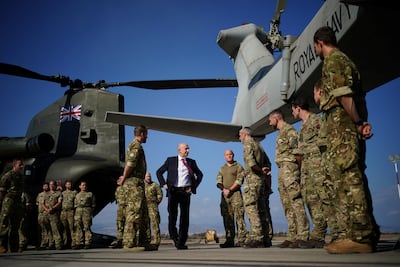
But this coalition appears increasingly fragile, with countries disagreeing on which direction to take. French President Emmanuel Macron called for a halt on all arms deliveries to Israel this week – contradicting the UK's position.
“The West is declining in its ability to stop this conflict from escalating,” said Michael Stephens, senior associate fellow at London-based think tank the Royal United Services Institute (Rusi).
“The scale of the conflict that we’ve seen in the last two to three weeks alone has been unprecedented,” he said at a talk organised by Rusi this week.
“If we’re taking about a restriction of arms sales – it’s a bit late. Israel will feel that its military operations will have done what it intended to do,” he said.
Palestinian recognition
Opposition also comes from those seeking more effective decisions on the Palestinian issue. The call to recognise Palestine, one of Labour’s election pledges, is still holding strong. Mr Zomlot reiterated this on Thursday, saying it was essential for “clarity” on the UK's position on the conflict.
Mr Zomlot said he had been in regular conversations with the government about this. “We tell them: every day that you wait, is another day that takes us in the direction we are headed now. It is the lack of clarity that has complicated things all these years,” he said.
Responding to Mr Starmer’s recent comment that recognition was not a matter of “if but when”, he said. “When is now? When is yesterday? You are three decades late at least.”
Keir Starmer's first months as prime minister – in pictures
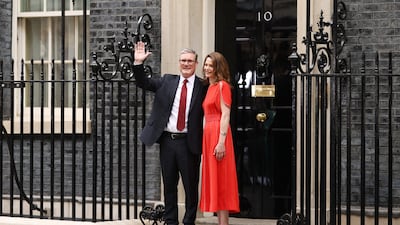
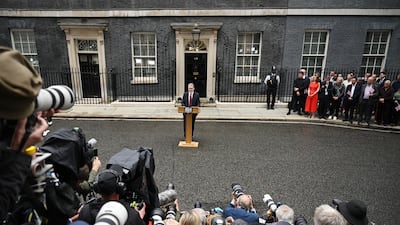
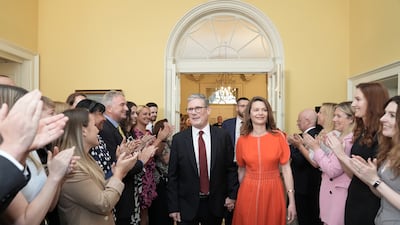
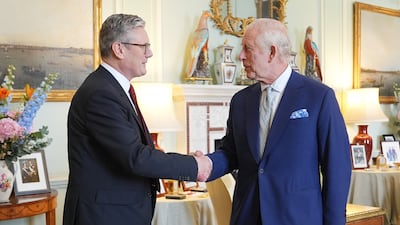





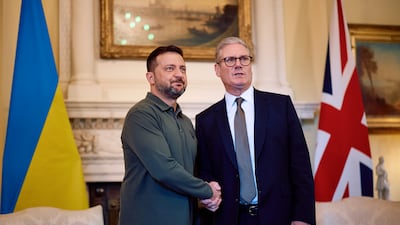



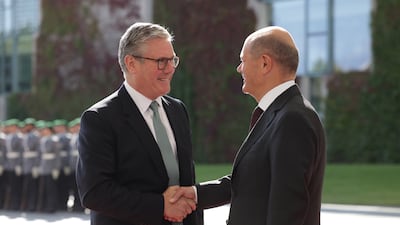



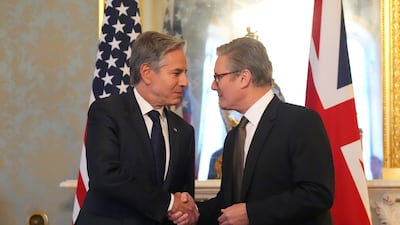

Ceasefire calls
A group of 15 NGOs accused the government of “merely paying lip service” to ceasefire and peace efforts.
“The UK is failing to stand up for international law, as Israeli forces are forcibly transferring civilians from northern Gaza to the south and relentlessly bombarding the area,” said the letter signed by UK charities Council for Arab and British Understanding, Amnesty International, Oxfam and Medical Aid for Palestinians, among others.
“The government must demand that Israel end its heinous attacks, and take action to oppose any annexation or shrinking of Gaza. It current silence is tantamount to complicity.”
The grouping called for the government to “unequivocally oppose” the transfer of civilians from northern Gaza to the south, to suspend all arms transfers to Israel, and to “take bold and concrete steps” around the opinions of the ICJ.

Others say the UK government has become entangled in unsustainable legal loopholes as it seeks to defend a decision to continue supplying the components for F-35 fighter jets. These are made in the US with British-made components, and some are sold to Israel, where there is evidence they have been used in attacks on Gaza.
The UK said it was seeking to preserve its contribution to the F-35 programme, and that it could not control where the components are used owing to the nature of the commercial contract it has signed.
“We already have a wealth of evidence that F-35s are being used in Gaza, including statements from the Israeli military,” said Oliver Sprague, director for the military, security and police programme at Amnesty International.
“You can't sign a contract that waives the legal responsibility you already have,” he added. The UK would need “some control” over where the components ultimately go, in the event that they ended up in “proscribed destinations” such as Russia, or with organisations such as ISIS, he said.
A case against the government by NGOs the UK-based Global Legal Action Network and Al Haq, a Palestinian rights organisation, will reconvene in November following the government’s decision to suspend some licences. The trial is very likely to focus on the supply of F-35 components.
Sidelined
Amid this bubbling discontent, British Palestinians with family still trapped in Gaza, or who lost relatives to the war, feel sidelined.
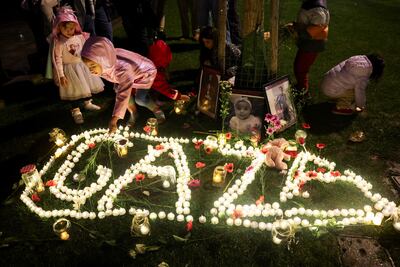
Omar Mokhallalati did not expect he would be standing outside Parliament a year on from the October 7 Hamas attacks on Israel, protesting against a war on Gaza that has raged since.
The candlelit vigil which he organised this week marked the day Israel declared war on Gaza last year. He was among the dozens of British Palestinian families who met outside Parliament to mourn the loss of family members in Gaza: parents, siblings, aunts, uncles, nieces and nephews.
“We want to to tell the stories of our people, so they are not forgotten in this unequal environment,” he told The National.
They also gathered to call on the UK government to do more to end Israel’s military campaign in Gaza. His disappointment was palpable. “We call on the British government to end its complicity with the occupation and to stop sending arms to Israel,” he said.
Mr Mokhallalati lost more than 40 members of his family in a single air strike. Among them was his aunt Fatma Mokhallalati, aged 73, who he said was Gaza’s first woman judge.
His remaining family are in northern Gaza. “They have had no electricity, no gas, no food for months. The only thing available to them now is water and bread. People wake up at 5am to queue outside the bakery, with the whole family. If you queue alone, you will only get one bread,” he said.
Khitam Atallah described losing her mother, three brothers and sister to the war. “How much I miss them, and feel that they took my soul with them forever. Do you know what it means to find yourself without a family? I who used to call them every morning,” she said. “You will never see their smiles, you will never hear their voices.
“If we were to reverse the situation, and I was an Israeli woman, saying that the Palestinian resistance had killed 48 members of my family, would you stand in silence? They turn a blind eye to the thousands of women and children being killed every day,” she said.
